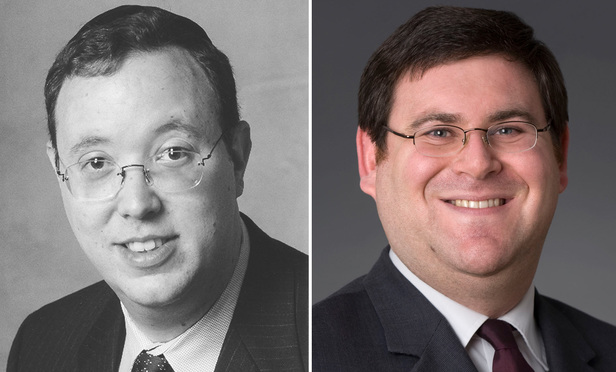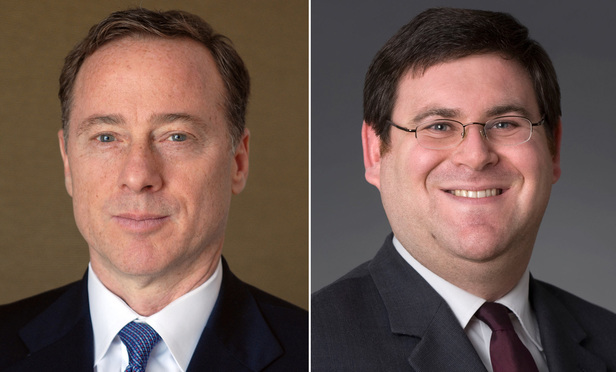Samuel P Groner

November 13, 2019 | New York Law Journal
Securities Act Claims in New York State Court: Trends and Observations a Year After 'Cyan'In the wake of the 'Cyan' decision, the number of 1933 Act claims brought in state court has increased dramatically, with the most significant increase occurring in New York.
By Samuel P. Groner and R. David Gallo
10 minute read

May 02, 2018 | New York Law Journal
State Court Securities Lawsuits and the PSLRA in a Post-'Cyan' EraThe court in 'Cyan' held that SLUSA does not prohibit state courts from adjudicating such claims, and that defendants may not remove such cases to federal court. As a result, it is likely that the recent trend of such claims being asserted in state courts will accelerate.
By Israel David and Samuel P. Groner
9 minute read

December 21, 2016 | New York Law Journal
Salman Insider Trading Decision: Lessons for Buy-Side AdvisorsKarl A. Groskaufmanis and Samuel P. Groner, of Fried, Frank, Harris, Shriver & Jacobson, examine the U.S. Supreme Court decision in 'Salman v. United States' on the test for tipper/tippee liability in insider trading law. They explain that it sets a line that separates fundamental investment research from fraudulent and potentially criminal conduct. While the case marks a clear victory for federal insider trading enforcement, they note that it also multiplies the challenges for lawyers and compliance officers advising buy-side investors.
By Karl A. Groskaufmanis and Samuel P. Groner
18 minute read

December 12, 2016 | New York Law Journal
Context Matters: 'Omnicare' RevisitedIsrael David and Samuel P. Groner of Fried, Frank, Harris, Shriver & Jacobson examine how courts in the Second Circuit, in the year and half since 'Omnicare' was decided, have applied three considerations in determining whether in context an opinion statement is misleading. These cases suggest that courts are increasingly open to viewing statements that might have been misleading in a vacuum as not misleading when properly understood in context and therefore not susceptible to liability on an "omissions" theory.
By Israel David and Samuel P. Groner
20 minute read

February 09, 2016 | New York Law Journal
Partial Settlements of Class Actions Not 'Covered' by the PSLRAIsrael David and Samuel P. Groner explore the PSLRA's settlement discharge and judgment reduction provisions and how they work in the context of settlements by covered persons, and then discuss the manner in which courts have taken those provisions into account in the context of settlements by defendants who are not covered persons.
By Israel David and Samuel P. Groner
12 minute read

January 07, 2016 | New York Law Journal
Mini-En Banc Review in the Second CircuitIn their Corporate Crime column, Steven M. Witzel and Samuel P. Groner discuss the Second Circuit's use of the "mini-en banc" when it desires to overrule one of its precedents but there is no intervening Supreme Court decision that it can point to for justification.
By Steven M. Witzel and Samuel P. Groner
23 minute read

January 06, 2016 | New York Law Journal
Mini-En Banc Review in the Second CircuitIn their Corporate Crime column, Steven M. Witzel and Samuel P. Groner discuss the Second Circuit's use of the "mini-en banc" when it desires to overrule one of its precedents but there is no intervening Supreme Court decision that it can point to for justification.
By Steven M. Witzel and Samuel P. Groner
23 minute read

December 18, 2009 | New York Law Journal
En Banc Review in the Second CircuitMichael B. de Leeuw, a partner with Fried, Frank, Harris, Shriver & Jacobson, and Samuel P. Groner, an associate at the firm, write: Much has been written about the Second Circuit's decision to affirm the district court's grant of summary judgment to the City of New Haven in Ricci v. DeStefano. But perhaps somewhat lost in the extensive analysis of the merits of Ricci is a lurking question best presented by a dissent by Chief Judge Dennis Jacobs from the denial of en banc review: Has the Second Circuit's reluctance to rehear cases en banc gone too far?
By Michael B. de Leeuw and Samuel P. Groner
11 minute read
Trending Stories
- 1BOI Reports: What Business Owners and Attorneys Should Know
- 2SurePoint Acquires Legal Practice Management Company ZenCase
- 3Day Pitney Announces Partner Elevations
- 4The New Rules of AI: Part 2—Designing and Implementing Governance Programs
- 5Plaintiffs Attorneys Awarded $113K on $1 Judgment in Noise Ordinance Dispute



